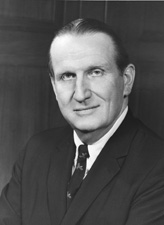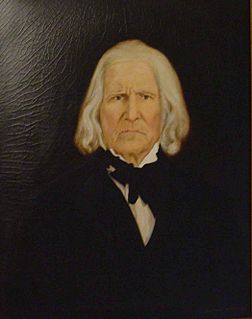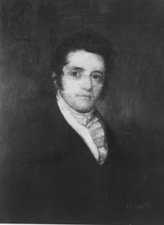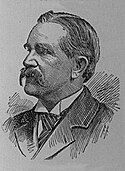
James Elisha Folsom Jr. is an American politician who was the 50th Governor of Alabama from April 22, 1993 to January 16, 1995. He has also served as Lieutenant Governor of Alabama on two separate occasions. He is a member of the Democratic Party.

James Browning Allen was a Democratic U.S. senator from Gadsden, Alabama.

William Dorsey Jelks was an American Democratic politician who was the 32nd Governor of Alabama from 1901 to 1907; he had been a newspaper publisher and editor. He also served as acting governor between December 1 and December 26, 1900 when governor William J. Samford was out-of-state seeking medical treatment. When Samford died on June 11, 1901, Jelks became governor. In 1904, Jelks fell ill and left the state for treatment; Russell Cunningham acted as governor in Jelk's absence from April 25, 1904 to March 5, 1905.

Hugh McVay was the ninth governor of the U.S. state of Alabama from July 17 to November 30, 1837. He was born in South Carolina.

Clement Comer Clay was the eighth Governor of the U.S. state of Alabama from 1835 to 1837. An attorney, judge and politician, he also was elected to the state legislature, as well as to the House of Representatives and the US Senate.
Samuel B. Moore was the sixth Governor of the U.S. state of Alabama from March 3 to November 26, 1831. He was president of the Alabama Senate when Governor Gabriel Moore was elected to the United States Senate, and so became governor when Gabriel Moore resigned to take the seat.

Russell McWhortor Cunningham was an American Democratic politician who was the acting Governor of Alabama from April 25, 1904 to March 5, 1905. He was lieutenant governor when Governor William D. Jelks fell ill and left the state for treatment, and since the Alabama Constitution requires that if the governor leave the state for more than 20 days, the lieutenant governor must act as governor until their return.

Gabriel Moore was a Democratic-Republican politician and fifth Governor of the U.S. state of Alabama (1829–1831).

The government of Alabama is organized under the provisions of the 1901 Constitution of Alabama, the lengthiest constitution of any political entity in the world. Like other states within the United States, Alabama's government is divided into executive, judicial, and legislative branches.

The Alabama State Senate is the upper house of the Alabama Legislature, the state legislature of the U.S. state of Alabama. The body is composed of 35 members representing an equal number of districts across the state, with each district containing at least 127,140 citizens. Similar to the lower house, the Alabama House of Representatives, the Senate serves both without term limits and with a four-year term.
Stephen Ralph Windom is an American attorney, politician and member of the Republican Party who served as member of the Alabama State Senate from 1989 to 1998 and as the 27th Lieutenant Governor of Alabama from 1999 to 2003.

The 2010 Alabama gubernatorial election took place on November 2, 2010. Republican Governor Bob Riley was term limited and unable to seek re-election. The party primaries were held on June 1, 2010, with a Republican runoff on July 13. In the general election, Republican Robert J. Bentley defeated Democrat Ron Sparks.
Greg Reed is a Republican member of the Alabama Senate, representing the 5th District since 2010. He defeated Democrat Brett Wadsworth in the 2010 midterm elections to replace Charles Bishop in the 5th District.

The 2014 Alabama gubernatorial election took place on November 4, 2014, to elect the Governor of Alabama.
William M. Beasley is an American politician from the state of Alabama. He is a Democratic member of the Alabama Senate, representing the 28th district.

The 2016 United States Senate election in Alabama was held on November 8, 2016, to elect a member of the United States Senate to represent the State of Alabama, concurrently with the 2016 U.S. presidential election, as well as other elections to the United States Senate in other states and elections to the United States House of Representatives and various state and local elections.

The 2020 United States Senate election in Alabama will be held on November 3, 2020, to elect a member of the United States Senate to represent the State of Alabama, concurrently with the 2020 U.S. presidential election, as well as other elections to the United States Senate in other states and elections to the United States House of Representatives and various state and local elections.

The 2018 Alabama gubernatorial election took place on November 6, 2018, to elect the Governor of Alabama. Incumbent Republican Governor Kay Ivey, who took office on April 10, 2017, upon the resignation of Governor Robert Bentley, ran for election to a full term and won over Tuscaloosa mayor Walt Maddox. Ivey will be sworn into office on January 14, 2019. This is the first gubernatorial election since 2002 in which a Democrat won Tuscaloosa County and the first since 1990 in which neighboring Pickens County voted for a different candidate than Tuscaloosa.















